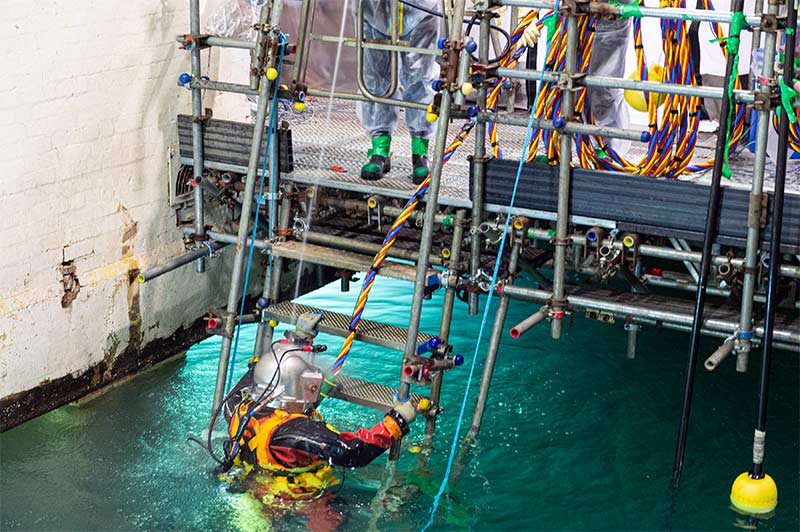
In December 2022, UCC UK became the first nuclear diving company in more than 60 years to enter Sellafield’s PFSP. (Photo: Sellafield Ltd.)
Underwater Construction Corporation (UCC) UK Ltd. announced that it has recently completed a nuclear diving pilot project at the Pile Fuel Storage Pond (PFSP) at the Sellafield nuclear site in Cumbria, England. UCC UK said the project marks a significant decommissioning milestone for Sellafield, demonstrating the capability of the company’s methods and equipment to remediate the legacy nuclear pond while limiting worker dose.
The oldest pool on the Sellafield site, the PFSP was constructed between the late 1940s and early 1950s as a storage and cooling facility for irradiated fuel and isotopes from the two Windscale reactors and was in full operation until 1962. Then through the mid-1970s, the pond facility, one of six on the site, was used for storage of intermediate-level waste and fuel from the U.K. nuclear program.
A first since 1958: In December 2022, UCC UK became the first nuclear diving company in more than 60 years to enter the PFSP. According to Sellafield Ltd. and the U.K.’s Nuclear Decommissioning Authority (NDA), “The last time a human entered Sellafield’s Pile Fuel Storage Pond was in 1958 when records show a maintenance operator and health physics monitor carried out a dive into the newly constructed pond to repair a broken winch.”
A subsidiary of NDA, Sellafield Ltd. is the site license company tasked with the remediation of the Sellafield nuclear site, including the decommissioning of its legacy nuclear ponds.
Lead-up work: According to UCC UK, prior to the dive, the company, in partnership with Sellafield Ltd., spent more than four years developing customized procedures, processes, and equipment to optimize safety and working conditions for the divers while minimizing exposure to radioactive materials. Dive trials were conducted at an off-site facility that closely mimicked the PFSP using specially developed dive platforms, CCTV monitoring, diver-manipulated long-reach tooling, cutting equipment, and radiation monitoring equipment.
UCC UK said the use of experienced nuclear divers complements previous pond work that used remote systems and equipment, and the rigorously monitored activities allow the diver to be close to the work. This ultimately reduces schedule time and in turn helps reduce the risk, the company added.
They said it: “Since the 1970s, our nuclear diving experience has shown that the safe use of divers lowers overall program radiation exposure; reduces overall schedule and cost; and is regulator endorsed, proven, and repeatable,” said Philip McDermott, chief operating officer of UCC UK.
Carl Carruthers, head of Sellafield Ltd.’s program delivery for legacy ponds, added, “Collaborating with UCC UK Ltd. has helped us make real progress in cleaning up the PFSP and will help us deliver our mission of creating a clean and safe environment for future generations.”